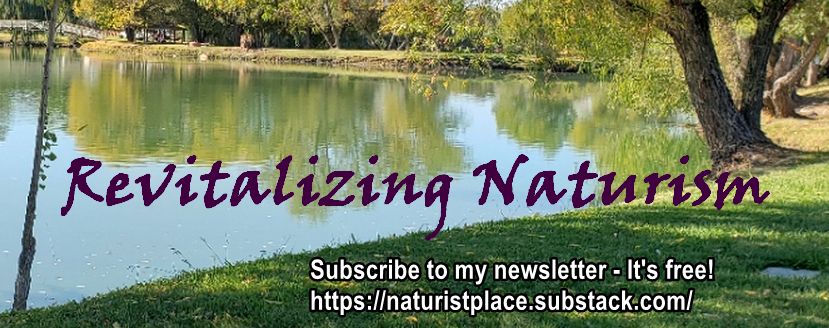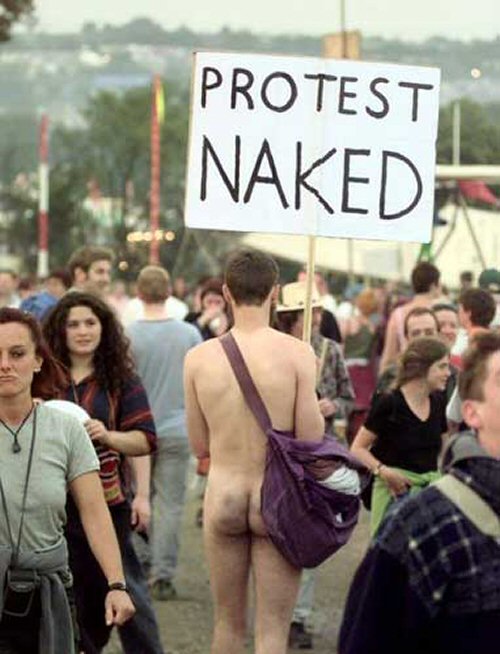
- Naturists. Are we all protesters?
Nick and Hannah make so many excellent points in this post on their relatively new blog (already referenced here) I wish I could quote most of it. Many, perhaps most, naturists don’t think of themselves as protesters hopeful of spreading a message and changing society. They simply enjoy being naked, for a variety of good reasons. One thing that most naturists don’t do is publicly protest naked to promote naturism itself. If they do protest fully or partly naked, it’s for some other worthy cause, such as in favor of bicycle safety and against the use of fossil fuels, as in World Naked Bike Rides. Or, as mentioned in this article, Dr. Victoria Bateman‘s protest against Brexit.
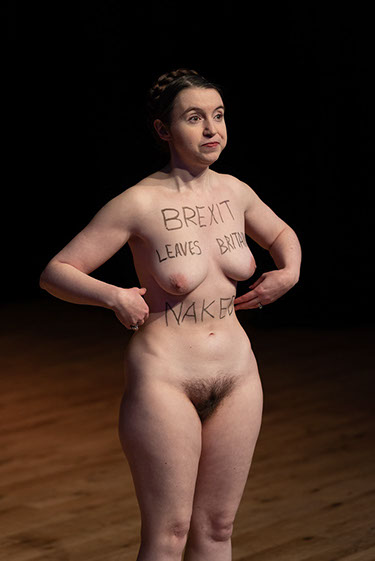
Nudity has been used in a variety of other protests over the years, e. g. the Doukhobors, PETA, and Femen. I recently reported on other protests here. It’s no mystery why nudity is used in such protests: it definitely gets attention.There have, actually, also been a few protests for the right to be publicly naked, particularly in San Francisco when a stricter law against public nudity was passed a few years ago. (But naked protests and certain other events with public nudity are still allowed there if permits are obtained.) Nevertheless, this is pretty rare. In fact, this kind of protest could be counter-productive in most cases, because a right to even limited public nudity isn’t considered a compelling issue for most people – unlike, say, animal rights or climate change. Yet Nick and Hannah correctly observe “There is no escaping, however, that for many naturists, whether they realise it or not, there is an element of protest to their desire to be naked in a social setting.”
A general right to public nudity is too much to expect at this time. But what about a right to private nudity? Apparently even that is too much to hope for in backward places like Utah, as discussed here. While more enlightened places don’t put legal restrictions on nonsexual nudity in private spaces, such restrictions are still prevalent, simply because of social attitudes that nudity in most cases may be “offensive”, probably “immoral”, and certainly not “normal”. As the article points out, “We are brought up in a world where social nudity is anything but normal. Our bodies are emphatically not our own, they belong to ‘moral’ society. It is ‘moral’ society which dictates what we should wear to which occasions.”
Of course, the idea that simple nudity in itself is “immoral” is ridiculous – except in a very twisted notion of “morality”. The source of this aberrant notion is not hard to understand: it is the imperative for social control. Quite simply, as the article points out, “Step over the line and the disapproval will try to bring you to heel. ‘Moral’ society fears those it cannot control.” It would be one thing if society had a rational view of the morality of social nudity. But a rational view doesn’t exist now – not of nudity, nor of many other things as well. Unfortunately, society isn’t great at controlling serious crime, gun violence, racial prejudice, etc. But controlling nudity is easier, so it gets controlled instead.
In their article, Nick and Hannah observe that simply by doing what isn’t “normal” and enjoying nudity when and where we can “we are protesting, albeit to varying degrees and sometimes more subconsciously than consciously.” Furthermore: “You may not previously have considered yourself a protester but you should not be embarrassed by the protest element of naturism, rather you should celebrate it.”
It may not be clear to most naturists what their nudity is protesting. However, aren’t we “quietly protesting against being unreasonably controlled? Protesting in favour of issues such as body positivity and confidence, tolerance, inclusiveness and respect? Protesting about the sexualisation of the naked body?” They conclude “Our ultimate goal should be to take the protest out of naturism and to make social nudity entirely normal and unremarkable.” In other words: normalize nudity.
- Normalising Nudism
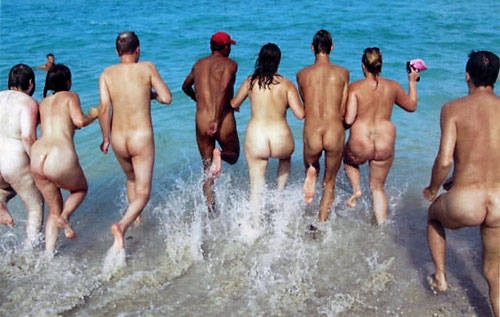
It’s not necessary to say much about this – the idea speaks for itself. “#NormalisingNaturism” is now a Twitter hashtag. I prefer to express the idea as “normalize nudity”, because many people aren’t interested in being labeled, yet they approve of nonsexual social nudity and probably enjoy it when they can. The article suggests that it’s not necessary to surprise your friends by going naked with them without any warning. (Exception: at your own home, if you have a swimming pool or a spa, you might suggest a skinny-dip.) But that shouldn’t stop you from mentioning to open-minded friends that you enjoy nonsexual nudity and explaining why. Perhaps some will even invite you to “get comfortable”. Wearing nothing needs to become just another acceptable choice of attire when practical.By the way, notice how often the idea of normalizing nudity comes up in many of the articles here. Naturists need to emphasize to anyone who’ll listen that nonsexual social nudity really needs to be considered normal, not some crazy, deviant eccentricity.
- Nothing wrong – and lots right – with a bit of public nudity
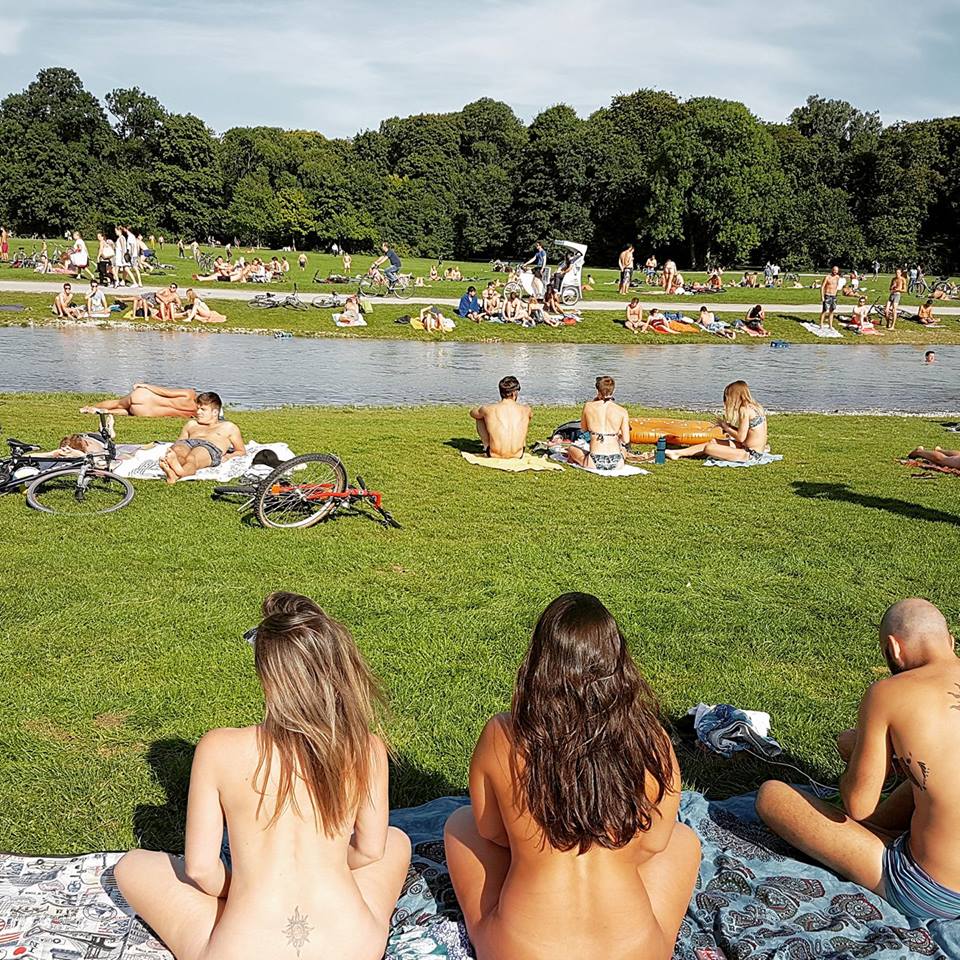
The picture is of Munich’s Englischer Garten, where nudity has been normal and accepted in this part for at least 50 years. (This part happens to be only about 100 meters fron the back of a major art museum, in the center of the city.) But the story is from New Zealand. In fact, it appeared in the New Zealand Herald, which has the largest circulation of all newspapers in the country.The writer, Vera Alves, a “Social Media and Trending Reporter” is responding to a couple of incidents – a nursing mother was asked to cover up while breastfeeding, and a family that was “shocked” to see naked bathers at a clothing-optional beach. Vera doesn’t mince words. “For such a progressive country – first to split the atom and all that – we’ve still got some pretty archaic views on things,” she says.
This really is an amazing article that naturists should share with as many people as possible. Vera goes on to make many very incisive points on public nudity, which I’ll quote or paraphrase. I don’t know whether she’s a confirmed naturist, but I don’t know how anyone could make all these points much better.
- The first point is in the headline: There really is nothing wrong with public nudity (assuming it’s in appropriate places and respectful of others).
- Too many people are “hung up on the unclothed human body.”
- There shouldn’t be any serious trauma from “seeing a stranger’s intimate body parts.”
- People who are bothered or offended by nudity should start asking themselves why.
- Given how many real problems there are to worry about, seeing “nipples and penises should be the least of” one’s worries now.
- “Children who are soon going to be adults” will “grow up with some really messed up views of what bodies look like, if we keep restricting them to the bodies they see on porn sites or in fashion magazines.”
- “This repressed and archaic view of the human body as something to be hidden and ashamed of is nothing if not a form of oppression – and there are far too many people going along with it without questioning it.”
- People can change their negative way of thinking about nudity to understand it the way naturists do, “and absolutely nothing bad at all will happen.”
- Children whose parents are more open-minded about nudity “will not grow up to be depraved – if anything, they might just grow up more confident and empowered.”
- The real problem “is not nudity. The problem is the over-sexualisation of the human body, which leads to all kinds of issues.”
- “‘Normalising’ the regular human body can be a really good thing. If our children are to grow up with healthy views of what a normal human body is, we need to shed these archaic taboos.”
- If your child has questions about seeing someone naked, you have “a golden opportunity to talk to them about things like boundaries, consent and respect for others.”
- The human body is not immoral – stop making it so.
- “The bottom line is: if you’re getting your knickers in a twist, maybe the knickers are the problem.”
Wow. Hits it out of the park with three on the bases. - Is Naturism the solution to low body confidence?
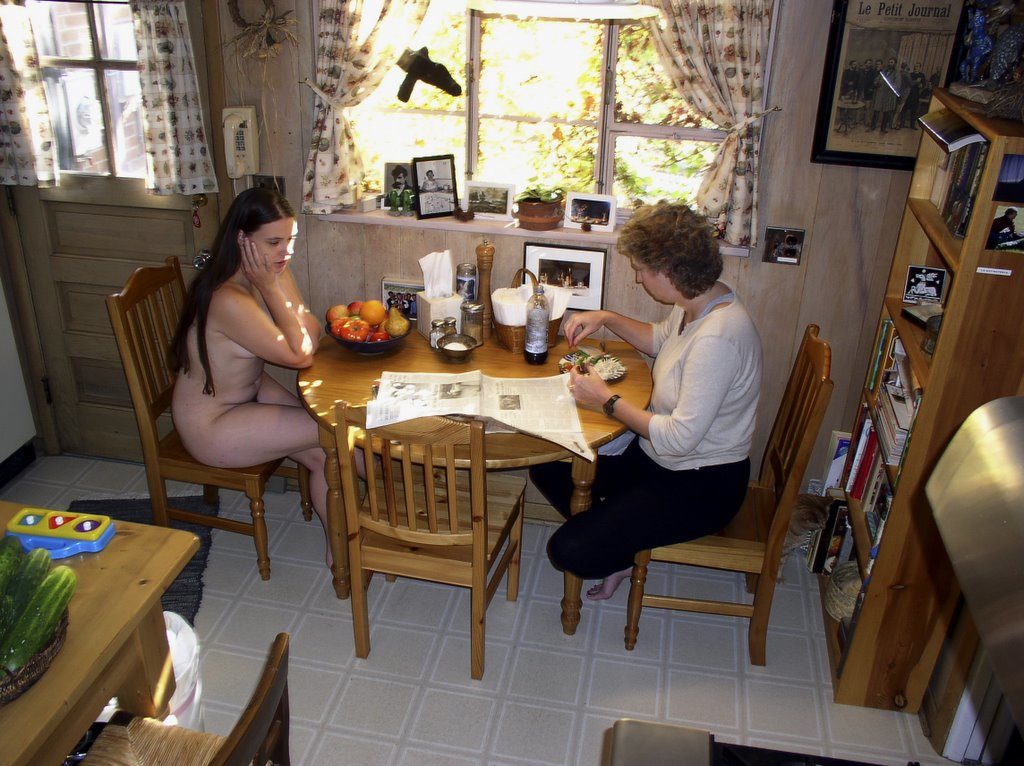
It’s a rhetorical question to which naturists know the answer very well. A writer for a non-naturist site demonstrates how obvious the answer is. Here’s the nut graf:
“In a world dominated by social media, many of us are used to seeing men and women with perfect bodies on our screens every day of every week, and it’s no secret that this can have a negative effect on our own body image. However, people all around the world are using Naturism as their way to feel more comfortable in their own skin.”Mark Walsh, a spokesperson for British Naturism, is quoted pointing out that naturism often “starts at home, just by shedding your clothes, existing and just being comfortable in your own skin. As soon as you’re comfortable in your own skin, it really doesn’t matter where you’re comfortable in your own skin.” Provided that others you live with aren’t bothered by your nudity, the more time you spend naked, the more it will seem normal to you. That’s why your home is usually the best place to start experimenting with nudity – the people you live with are probably more likely to accept your nudity than random people you know, let alone (non-naturist) strangers. (However, if people you live with aren’t comfortable with nudity, you’ll need a Plan B.)
Mark explains that the basic reason naturism is the solution to low body confidence is because “it reinforces that there is no normal standard – we are all made different, and that’s who you are.” That assumes you’re ready to be naked not just in your own home, but also with a variety of others you’ll see in naturist activities and events. Stephanie Silom, the writer of the article, summarizes that “our body confidence and the extent to which we base our self-worth on our bodies improves massively once we learn that almost no-one has a ‘perfect’ body.”
- 7 Clothing-optional places to go naked in Colorado
Articles like this, which are targeted to a mainstream audience, indicate that public nudity is – however slowly – gradually becoming normalized even in the U. S. The fact that an article like this was published shows recognition that people exist who know little or nothing about naturism but are interested in places they can safely get naked outdoors. All locations described here are clothing-optional, at least most of the time. All but one of them have hot springs to soak in, and may be either rustic or somewhat developed. The exception, Mountain Air Ranch, is a full-featured naturist resort, the only one in Colorado. The article is also here - Corsica – a rough hewn, sparkling gem
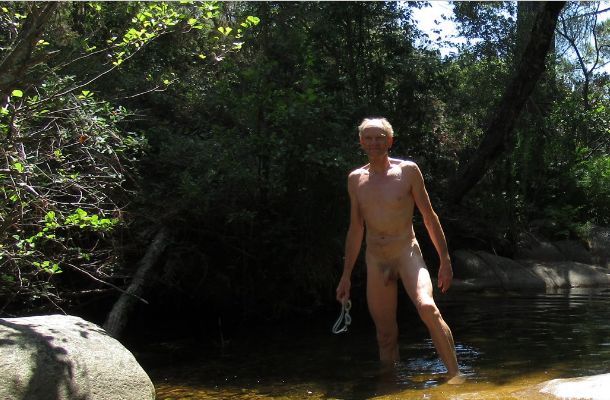
Looking a little farther afield – at least for folks in North America – there’s Corsica, a French island in the Mediterranean, known as Corse to the French, but which is nearer to Italy than France. Here’s a report from Olly Watts, a British Naturism member, on his stay on Corsica with a companion. Corsica is a smallish island of 8722 km2 (3368 mi2), about ⅔ of which is mountainous. Because of the size, distances between interesting spots are measured in just a few tens of kilometers at most. Olly spent the first part of his fortnight vacation in the vicinity of Porto Vecchio, near the southeast tip of the island. The area offers both beach and mountain places to be naked. Olly’s account makes the places he visited sound like a naturist paradise, where full-time nudity was often possible. The latter part of the trip was mostly on the eastern side of the island. That included a stay at Riva Bella, a four-star naturist campsite, where the stretch of sand “seemed to curve forever, north from the nature reserve.” Because Corsica is all part of France, there’s the additional attraction of French food and wine – with Italian influence as well.The Meandering Naturist blog has much more information on Corsica.
- Camping in heaven
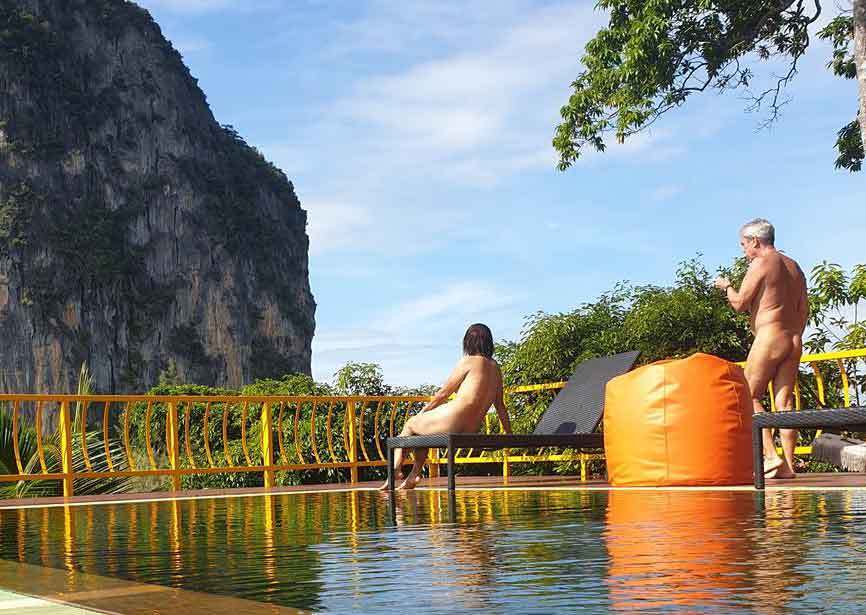
Looking further afield still, how about Thailand? Did you know that Thailand is about the only Asian country with attractive places for naturists? Well it is. There’s even a Thailand Naturist Association. This is article is about a visit to the Barefeet Heaven Naturist Resort.Although Barefeet is a developed naturist resort, Chew, the author of the article, chose to stay in a tent she’d brought. So that allowed for a real camping experience, but also access to resort facilities. The location is ideal for camping, since it’s located in the Hat Chao Mai Marine National Park. On one side of Chew’s campsite “was a river with spectacular rock formations. The other was [a] stunning limestone cliff that was so close to me. In fact, the whole surrounding was a wide and open fabulous view with no block in any corners.” There’s an “unofficial” nude beach just a short walk away. In summary, “Barefeet is a wonderful place not only for naturists but also nature lovers, birding activity and meditation retreat for its nature preservation and tranquility as well as its laid-back and peaceful atmosphere in the surrounding areas.”
The Naturist Wanderings and Naturism Girl blogs have more information on Thai naturism. Here’s what Naturism Girl has to say about Barefeet. And here’s the Naked Wanderings review of it.
